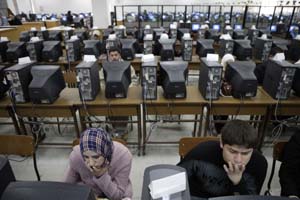Muslims using Internet shown to have more positive views of Christianity

Muslims using Internet seen to have more positive views of Christianity
A report by the Pew Forum of Religion and Public Life has found that Muslims who use the Internet are more likely to not only have positive associations with Western culture, but are also more likely to see similarities between Islam and Christianity.
The May 31 report derives from the survey, The World's Muslims: Religion, Politics and Society, drawn from Muslims in 39 countries, including Afghanistan, Nigeria and the Indonesia.
When it comes to the idea that Islam and Christianity have "a lot in common," Muslims who use the Internet were more like to believe this than offline Muslims by anywhere from 1 to 28 percentage points.
In Pakistan, for example, 35 percent of Internet users believed there were similarities between Islam and Christianity, but only 7 percent of non-internet users believed so.
In Iraq, 43 percent of Internet users believed Islam and Christianity had common ground, compared to 24 percent of non-Internet users.
The pattern held across the board, except in Morocco, the only country where increased Internet usage had an inverse relationship with perception of interreligious commonality.
While, according to the survey, participation in interfaith meetings remains the most effective way to promote feelings of commonality, Internet usage is equally as influential as higher education.
The survey did find, however, that despite having an effect on whether Muslims saw commonalities between Islam and Christianity, Internet usage did not affect Muslims views of Islam.
"Holding other factors constant," the report reads, "Muslims who use the Internet are about as likely as those who do not use it to say that Islam is the only path to heaven (rather than saying that many faiths can lead to eternal salvation). Internet users and non-users also are about equally inclined to say that Islam has only one true interpretation."
Together, the Pew surveys involved more than 38,000 face-to-face interviews in 80-plus languages and dialects, covering every country that has more than 10 million Muslims except for a handful (including China, India, Saudi Arabia and Syria) where political sensitivities or security concerns prevented opinion research among Muslims.